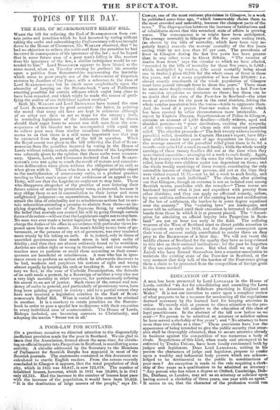A POOR-LAW FOR SCOTLAND.
ON a previous occasion we directed attention to the disgracefully inefficient provision made for the poor in Scotland. We are glad to learn that the Association, formed about the same time, for obtain- ing an official inquiry into Pauperism in Scotland, is manifesting some activity. A circular addressed by the Secretary to the Members of Parliament for Scottish Burghs has appeared in most of the Scottish journals. The statements contained in this document are calculated to startle English readers. From the census •recently concluded in Glasgow it appears, that the total population of that city, which in 1831 was 89,847, is now 122,878. The number of inhabited houses, however, which in 1831 was 19,200, is in 1841 only 22,751. Had the increase in the number of houses kept pace with the increase of the population, it would have been 25,463. "It is the destitution of large masses of the people," says Dr. Cows a, one of the most eminent physicians in Glasgow, in a work he published some time ago, "which -immoveably chains them to the most crowded and uoheahhy, because the cheapest parts of the town." The disproportion between the increase of habitations and of inhabitants shows that this stretched state of affairs is growing worse. The consequence is as might have been anticipated. The average mortality in Glasgow of the five years ending 1840, (as shows] by the bills of mortality, which have been very re- gularly kept,) exceeds the average mortality of the five years ending 1830 by not less than 25 per cent. The prevalence of fever in Glasgow during the last five years has been greater than in any other town in Great Britain. " The number of deaths from fever," says the circular to which we have alluded, "recorded in the bills of mortality for these five years, is 5,065; which, multiplied by twelve, (the usual mortality being about one in twelve,) gives 60,780 for time whole cases of fever in those five years, out of a mean population of less than 27'0,000: i.e. almost exactly one-fourth of the whole population of Glasgow mast have passed through fever in those five years." There must be some more deeply-rooted sliseasie than merely a bad Poor-law to occasion symptoms so inveterate as these; but there can be no doubt that the state of the Poor-law in Scotland—the utter want of provision for the poor in the rural districts, driving the whole surplus population into the towns—tends to aggravate them. And the want of a proper Poor-law makes the misery which has been created by other circumstances more intolerable. A report by Captain }theme Superintendent of Police in Glasgow, contains an account of 1,038 farrailies—chiefly widows, aged and -disabled persons—in " utter destitution, exciting •the sympathy of all who witnessed it" ; of whom only 406 received parochial relief. The circular proceeds—" The first twenty widows receiving parochial relief, described in Captain MILLER'S report, have fifty- nine children under ten years of age dependent on them; and the average amount of the parochial relief given them is 38. 8d. a month—not quite 11d. a week to each family ; while the whole weekly earnings of these twenty families did not at the time when they were visited exceed 63.—averaging 4d. a week to each family. Again, the first twenty-two widows in the same list who have no parochial relief, have forty-two children under ten dependent on them; and the whole weekly receivings of these women, constituting the only ostensible income of sixty-four persons, did not at the time they were visited exceed 1/. 7s.—not Is. 3d. a week to each family, and not 5d. a week to each individual." The circular, after pointing out that Glasgow, though an extreme is not an isolated case among Scottish towns, concludes with the remark—" These towns are burdened beyond what is just and expedient with poverty from other districts; and they can apply no effectual remedy, unless, by more uniform enforcement of the existing laws and modification of the law of settlement, the burden be in some degree equalized over the country." The "existing laws" are inadequate, and never will be enforced until their execution is intrusted to different hands from those in which it is at present placed. The "Associ- ation for obtaining an official inquiry into Pauperism in Scot- land " are not an hour too early in the field. The suffering weavers of the West of Scotland tried to direct public attention to this question as early as 1812, and the despair consequent upon their want of success mainly contributed to render them an easy prey to the ItICHMONDS of a later day. We will not taunt the middle classes of Scotland for the apathy they have so long evinced to this blot on their national institutions : let the past be forgotten if they are sincerely active now. But what shall we say of the Lairds who have formed themselves into a counter-association to maintain the existing state of the Poor-law in Scotland, at the very moment that they talk of the burden of the Poor-rates giving them a claim to be protected from the competition of foreign grain iu the home market I


























 Previous page
Previous page